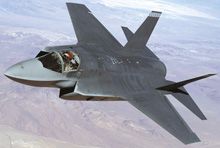
Rolls-Royce and GE are together battling Pratt & Whitney in the race to power the Joint Strike Fighter but critics say new problems with one team mean it’s time to cut it loose, leaving the estimated $100 billion-over-30-years prize solely to the other. Rolls-Royce apparently must redesign a component that helps hold its engine together, a step that critics say will raise costs and increase delays at a time that the Obama administration is pushing to cut the program’s overall costs. Congress has for years funded both engine development programs behind the logic that cutting either would remove competition and damage the product’s final value. But critics argue that the JSF project is already $16 billion over budget. A spokesman for Rolls-Royce told the Independent UK that the necessary redesign is not complex and full testing will resume in the new year. Rolls-Royce is the sole developer of engines for the vertical takeoff version of the JSF to be used by the Royal Navy, but demand for more conventional versions is expected to be substantially higher. The dollar signs involved mean that politics are also an issue.
Competition lost is one thing, but the costs of removing a country from the engine development program run deeper. The JSF is a multi-national project that has attracted eight nations as buyers and project supporters hope to see the program sell some 3,000 jets. Kicking any team out of the engine competition kicks that company’s national host out of the estimated $100 billion pie that represents potential powerplant contracts. In short, kicking any team out of the competition could bring political fallout that might further complicate the balance of the project’s joint partners.


































